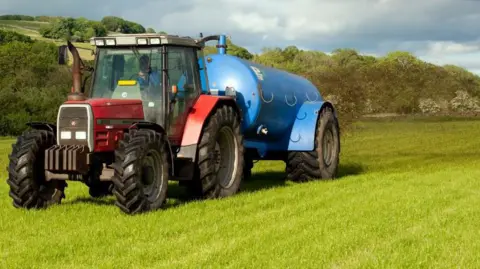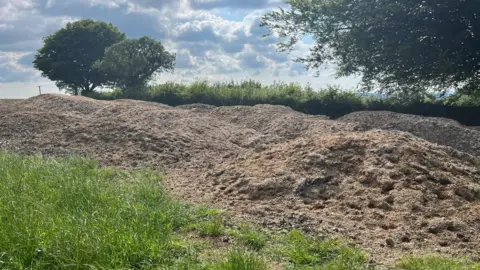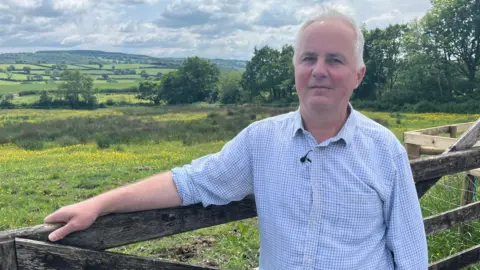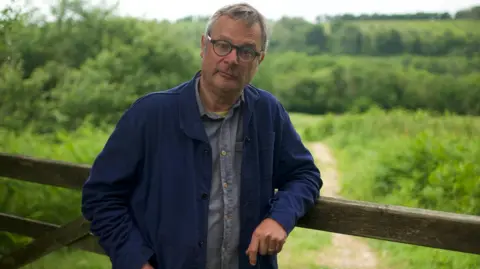
Atmosphere correspondent
 Getty Photos
Getty PhotosSuccessive governments have did not take care of the menace posed by spreading sewage sludge containing poisonous chemical substances on farmers’ fields, a former chair of the Atmosphere Company has instructed the BBC.
About 3.5 million tonnes of sludge – the stable waste produced from human sewage at remedy vegetation – is placed on fields yearly as low cost fertiliser.
However campaigners have lengthy warned a few lack of regulation and that sludge may very well be contaminated with cancer-linked chemical substances, microplastics, and different industrial pollution.
Emma Howard Boyd, who led the EA from 2016 to 2022, says the company had been conscious since 2017 that the sludge may be contaminated with substances, together with ‘perpetually chemical substances’.
“Eternally chemical substances” or PFAS are a bunch of artificial chemical substances which come from issues like non-stick saucepans. They do not degrade shortly in nature and have been linked to most cancers.
Paperwork seen by BBC Information counsel the water business is now more and more involved that farmers might cease accepting the sludge to unfold and that water corporations have been lobbying regulators and making contingency plans in case guidelines change.
Ms Howard Boyd says efforts to replace guidelines, which date again to 1989, to incorporate new contaminants had been “regularly annoyed by the dearth of ministerial urge for food to take care of this challenge.” In a public letter signed by greater than 20 others she known as on the present Atmosphere Minister Steve Reed, to behave now.
The Division for Atmosphere Meals and Rural Affairs (Defra) instructed the BBC laws round sludge spreading are being checked out. The water firms commerce physique Water UK instructed the BBC they had been conscious of the issues however that no authorized requirements for contaminants had been set by the federal government.
 BBC/Jonah Fisher
BBC/Jonah FisherNot like the cleaned water that’s discharged from wastewater remedy vegetation, the sewage sludge, or biosolid because the business calls it, is taken into account “exempted waste”.
Which means the remedy focuses primarily on killing micro organism and testing for heavy metals within the sludge.
There is no such thing as a routine testing for chemical substances, together with “perpetually chemical substances”, which have been developed over the past three many years and are moving into the sewage community from each from home and industrial customers.
“I feel the massive concern is as a result of these substances (perpetually chemical substances) are so persistent they’re going to keep round within the soil for a whole lot, if not 1000’s of years,” says Alistair Boxall, professor of environmental science at York College.
“It might be in 10 years’ time that we begin understanding that these molecules are inflicting hurt,” he stated. “Then we’ll be in a little bit of a multitude, as a result of we’ll be in a scenario the place we’ll have soils within the UK that may have residues of those molecules in them, and in the mean time we have now no approach of cleansing that up.”
In 2022, the US state of Maine turned the primary state to ban the spreading of sludge contaminated with “perpetually chemical substances” after excessive ranges had been present in water, soil and crops.
Experiences and emails proven to the BBC by Greenpeace’s Unearthed investigation unit and obtained utilizing Freedom of Data Act requests, reveal the water business is acutely conscious that attitudes are altering and is each lobbying authorities and making contingency plans.
The businesses are involved on two fronts: that normal guidelines concerning the spreading of sludge on land (so known as Farming Guidelines for Water) could quickly be tightened resulting from fears that it is polluting watercourses and that farmers’ issues concerning the chemical substances within the sludge would possibly make them unwilling to place it on their fields.
The water business has already commissioned reviews taking a look at what would possibly occur if the spreading is restricted.
One in every of them predicts that the “most probably” state of affairs is a shortfall of about three million hectares in land wanted to unfold the sludge. The water business says that might result in them both incinerating it or placing it into landfill. Each choices would carry further prices that might be handed on to billpayers.
“This investigation is but extra proof that we won’t belief the privatised water firms to take care of waste responsibly,” Reshima Sharma from Greenpeace stated.
“As long as they will get away with it, they may simply cross any issues on to our countryside and pocket the cash they need to be investing in options.”
 Getty Photos
Getty PhotosIn 2017 a report commissioned by the Atmosphere Company discovered that sludge contained probably dangerous substances, together with microplastics and “perpetually chemical substances”, at ranges that “could current a danger to human well being” and will create soil that’s “unsuitable for agriculture”.
It stated that “maybe the largest danger to the landbank” is from the spreading of bodily contaminants similar to microplastics into agricultural soil. The report additionally stated it had heard proof from EA workers indicating that some firms could also be utilizing wastewater remedy vegetation to “masks disposal of particular person excessive danger waste streams not appropriate for land spreading”.
“EA colleagues had been regularly annoyed by the dearth of ministerial urge for food to take care of this challenge,” Ms Howard Boyd, who was chair of the regulator on the time, instructed the BBC in an electronic mail.
“EA proposals since 2020 to reform the laws had been handled with a scarcity of urgency, hampered by delays in passing requests as much as the related ministers for decision-making, and a constant failure by successive secretaries of state to take the matter severely.”
The letter Ms Howard Boyd has signed collectively signed was organised by marketing campaign group Combating Soiled. It calls the contents of the sewage sludge a “soiled secret” and calls for that Atmosphere Secretary Steve Reed take motion.
 BBC/Jonah Fisher
BBC/Jonah FisherSewage sludge is cheaper than different fertilisers, and may generally be free, although farmers could must unfold it themselves.
Julie Lewis-Thompson tells me it has “the odor of loss of life”.
“It lingers within the air for someplace round two to 3 weeks,” she tells me after I go to go to in her house on Dartmoor within the south-west of England.
She’s gathered collectively a bunch of neighbours who’ve all had direct expertise of sewage sludge being unfold close to their properties. Earlier than we begin recording there is a lengthy dialogue about whether or not they need to converse out for worry of upsetting close by farmers and the contractors who unfold the sludge, who are sometimes native.
A lot of their issues are concerning the odor and about potential contamination of their water sources. One younger lady leaves in tears saying it had made her sick.
“The actual fact it is unfold without spending a dime ought to lift a couple of eyebrows,” Richard Smallwood, a neighborhood beef and sheep farmer who does not use sewage sludge, tells me.
“If we’re beginning to produce meals on grassland and arable land which is stuffed as much as the ear holes with PFAS compounds and nano and micro-plastics that discover their approach into the meals chain I feel my job’s over earlier than I start.”
 BBC/Kevin Church
BBC/Kevin ChurchWith the alternate options to sewage sludge disposal expensive, there’s broad settlement that the recycling of sludge into fertiliser needs to be made to work.
“In precept, I feel utilizing correctly handled human sewage to unfold on the land, put it again into the bottom for rising meals within the UK, that is the appropriate factor to do,” Hugh Fearnley-Whittingstall, the prepare dinner, author and broadcaster, tells me at his small farm and café in east Devon. He is additionally signed the protest letter to the setting minister.
“We all know it is occurring. Our farmers are rightly apprehensive. We have to take motion. Authorities’s bought to take motion,” Mr Fearnley-Whittingstall says.
“Which means laws are usually not voluntary laws or pointers, [they should be] legally enforceable laws that cease these pollution moving into the sewage and onto our land.”
Regardless of the issues there are nonetheless loads of farmers who see the sludge as an inexpensive technique to fertilise their fields.
Will Oliver is on the Nationwide Farmers Union Crops Board. He says he applies about 800 tonnes of sewage sludge yearly to fields the place he grows maize destined for animal feed.
The water firm offers the sludge without spending a dime and Mr Oliver says he is cautious how a lot he makes use of and trusts the corporate to ensure it does not have chemical contamination.
“If we may be wise with the way it’s used and unfold on the land, it may be constructive for farmers and for the water firms,” he says.
“I am doing it as a result of it is including worth. It is bettering our natural matter. It is benefitting the crop that I am rising, and it is decreasing my spend on bagged fertilisers.”
The Division for the Atmosphere, Meals and Rural Affairs didn’t contest something the previous chair of the EA Ms Howard Boyd instructed the BBC.
“We have to see the secure and sustainable use of sludge in agriculture to assist clear up our waterways,” a spokesperson stated.
“The Unbiased Water Fee will discover a variety of points, together with the regulatory framework for sludge spreading, and we proceed to work carefully with the Atmosphere Company, water firms and farmers on this space.”
Water UK represents the water firms of England and Wales, and a spokesperson stated: “Though there are some issues that some bioresources could comprise contaminants, similar to microplastics and perpetually chemical substances (PFAS), there aren’t any authorized requirements for them and, in some circumstances, no agreed evaluation methods.”
“Any requirements and methods are a matter for the federal government and the regulator and must be based mostly on agency proof and detailed scientific analysis.”


